A few years ago a Supreme Court Judgement became a hot topic in the world of Scottish Divorce Law. It concerned the right to property by cohabiting partners who had recently separated.
The case, Gow vs Grant, was especially significant in Scotland because it was widely held as an example of Scottish Law’s flexibility compared to that of English. It also highlighted a point constantly seen in Scottish separation cases; married couples are in a better position.
Assumptions
As we mentioned in an earlier article, there is a tendency for cohabiting couples to assume they have the same rights as married couples. This simply isn’t true. And when it comes to separation being unaware of the differences can be devastating for your property and, crucially, your children.
If you want guaranteed financial protection from the consequences of a Scottish separation, the best bet is to get married. Obviously this isn’t the classic reason for marriage but in the eyes of the law it’s the best way to safeguard your future.
Marriage in Scotland
Scottish marriage law is big on the “’Till death do us part” idea. Meaning your marriage contract assumes you’ll be willing to share your assets with your partner, and vice-versa, for the foreseeable future.
So when it comes to divorce the law states that all assets should be divided equally. This is of course in the exception of special circumstances, which you can find out more about here.
Cohabiting in Scotland
Living with a partner offers very little legal protection or guarantee of a fair deal if you separate. The law relating to cohabitants will only assist if one party has economic advantage as a result of the other’s contributions, or if one party has suffered economic disadvantages.
As you can imagine, this isn’t very black and white and can be especially difficult to prove to a judge. There are also short time constraints for making claims like these.
Is marriage the answer?
Getting married can offer stability and insurance of a fair deal. That’s not to say it should be considered on those terms alone, but it has definite advantages when it comes to separation.
And unfortunately in cohabiting cases there are numerous examples of one partner ending up with the money and assets and the other left with either nothing or sole responsibility for the children.
This might seem like a cold view of marriage, but in legal issues it’s a separate entity.
There are a couple of ways to get a firmer grasp of these issues:
- Download the Scottish Government’s leaflet ‘Living Together in Scotland’, which goes into detail about the financial aspects of cohabitation.
- Get in touch with Beverley Johnson today. As one of Edinburgh’s leading authorities on Scottish Divorce, she’ll be able to give you all the information you need.







